Why a King’s breakfast
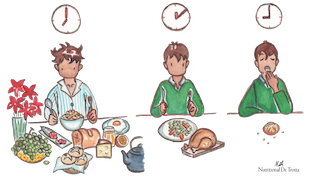
 Breakfast in danger!
Breakfast in danger!
A study by Credoc (center de recherche pour l’étude et l’observation des conditions de vie) from August 2015 showed that breakfast, the essential meal of the day is increasingly neglected by children and adults.
Around 30% of children and 20% of adults do not eat breakfast every morning.
What’s more, the proportion of individuals eating a full breakfast fell from 40% in 2007 to 20% in 2013.
As a result, there are fewer and fewer nutritional components in French breakfasts.
More and more students arrive at school hungry!
Only 20% of these students who skip breakfast come to school with a snack.
More and more adults only have coffee in the morning.
In one out of two cases, skipping breakfast is an almost daily occurrence.
 The survey revealed that for teachers, children who have skipped breakfast are more tired, less focused, less attentive and less participative.
The survey revealed that for teachers, children who have skipped breakfast are more tired, less focused, less attentive and less participative.
What’s true for children is also true for adults. Skipping breakfast, or eating an incomplete breakfast, is no trivial matter.
I often use the following comparison in consultation with my patients to re-educate them to healthy nutrition: your body is like a car that needs energy supplied by a tank – gasoline. The day is like a long journey from Paris to Nice. If you leave Paris in the morning with an empty tank (you want breakfast), you won’t get very far.
For the brain to function optimally, it needs to be supplied with sugar in regular quantities, without jolts or irregularities.
The danger of skipping breakfast lies in the risk of hypoglycemia: the drop in blood sugar levels will trigger the following reflexes in the brain : irritability, aggressiveness, dizziness, feeling unwell, loss of memory, loss of efficiency, fatigue, trembling, etc. etc. Everyone has more or less experienced these symptoms, which are very unpleasant and lead to hunger pangs, exacerbating the vicious circle since we generally quickly turn to high-sugar foods to compensate for this drop in blood sugar levels.
I personally discovered the importance of breakfast by reading the books of Doctor Catherine Kousmine, one of the pioneers of healthy nutrition in the 70s.
Until the age of 40 , I was a devotee of the classic Western breakfast: lots of milk, white bread with butter and jam or industrial cereals, never fruit, never protein, never nuts or almonds… For health reasons (recurring colds and sinusitis, chronic low back pain with accelerated ageing) I made a deliberate spontaneous choice to change my breakfast at the age of 40 following the reading of Dr Catherine Kousmine’s book “sauver votre corps”.
So I cut out milk, white bread and industrial cereals and started making the famous BUDWIG cream recommended by Catherine KOUSMINE in her books.
It’s a breakfast based on wholegrain cereals, organic fromage frais, first cold-pressed sunflower oil, walnuts or hazelnuts and fresh seasonal fruit.
Just by changing my breakfast, my health has improved considerably, after three difficult months (elimination crisis toxinic) and I have now been following this breakfast for almost 10 years.
I’ve improved it little by little, and at the end of this article I’ll give you my recipe for a healthy breakfast that anyone can make.
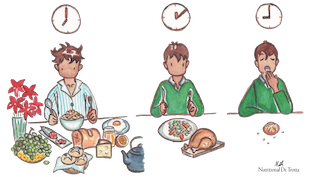 It’s important to understand that the only meal you can control 100%, especially when you’re an adult and your job requires you to have dinner or lunch away from home, is breakfast.
It’s important to understand that the only meal you can control 100%, especially when you’re an adult and your job requires you to have dinner or lunch away from home, is breakfast.
Breakfast must therefore be that of a king: for its quality and for its quantitative importance.
It really is one of the most important secrets of your health.
The profitability of breakfast far exceeds all stock market indices!
The better you eat and the more time you take for breakfast, the more time you’ll save during the day and throughout the year, reducing fatigue, fatigue, illness, infections, aches and pains, etc. etc.
Your body must therefore be supplied with the following nutrients through breakfast if it is to function properly throughout the day:
– Complex carbohydrates: give preference to slowly assimilated sugars to provide your brain with a constant and regular sugar level. So choose wholemeal bread and wholegrain cereals rather than refined industrial cereals and white bread. Avoid brioches (except on Sundays), sandwich loaves and brioche breads, which contain too much butter and palm oil and are made from refined wheat flour (which has had its outer coating removed, along with its minerals and B vitamins).
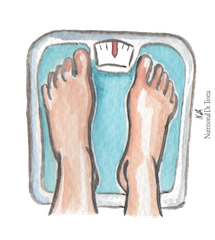 For those with gluten intolerance, choose wholemeal bread made from small spelt or wholemeal cereals made from small spelt, buckwheat, corn, quinoa or brown rice.
For those with gluten intolerance, choose wholemeal bread made from small spelt or wholemeal cereals made from small spelt, buckwheat, corn, quinoa or brown rice.
– Lipids: Let me remind you that your brain is made up of 70% fat, and you need to provide it with “good fat”. The good fat are nuts and good vegetable oils from rapeseed, linseed or walnuts, first cold-pressed and extra virgin. These oils are easily found in all organic stores. Avoid bad fats which damage your brain and cause inflammation in your body, the root cause of modern diseases: palm oil, sunflower oil in excess, excess milk, yoghurt and industrial cottage cheese. All industrial products, and in particular the famous breakfast cereals, contain palm oil, which is the most economical oil for industrialists, but very bad for your health.
– Proteins: these are almost systematically forgotten, except in Anglo-Saxon countries where the famous English breakfast is too rich in unhealthy fats such as bacon and sausages.
Breakfast must be protein-packed, according to the latest research in nutritional chronobiology. You need to provide your brain with the essential amino acids it needs to function properly: organic farm eggs contain all the essential amino acids and are the best protein for breakfast. You can also alternate with white ham, sheep’s or goat’s cheese or dried duck breast….
In working-class circles, the tradition of a real lunch in place of breakfast has sometimes been maintained and should be preserved. In the few countries where I have lived (Yemen, Ecuador), breakfast has remained balanced as a real lunch with chicken and rice or lentils or soya or beans.
– Vitamins contained in fruit. It’s better to eat a whole fruit than a fruit juice, because fruit juice causes blood sugar levels to peak too high, which can be followed an hour later by hypoglycemia. causing discomfort.
What’s more, for those who want to lose weight or maintain a healthy weight, skipping breakfast is the worst thing you can do, because the calories that will not have been ingested in the morning will be ingested in the evening, and you’ll put on weight at night.
The adage “qui dort dîne” is true: I advise all my patients to have little dinner in the evening. This way, they’ll get up in the morning feeling hungry, and make a king’s breakfast!
For those who prefer video to reading, here’s a recent report explaining this in pictures, thanks to my dear colleague Professor Henri Joyeux.
Need more information and to meet Dr. Pascal Trotta?
Make an appointmentAlso read
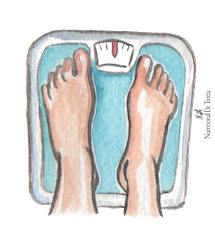
Dr Trotta's evening slimming-detox micro-fasting
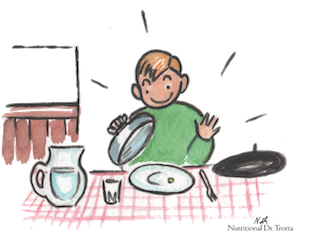
Fasting for healing
 Breakfast in danger!
Breakfast in danger!